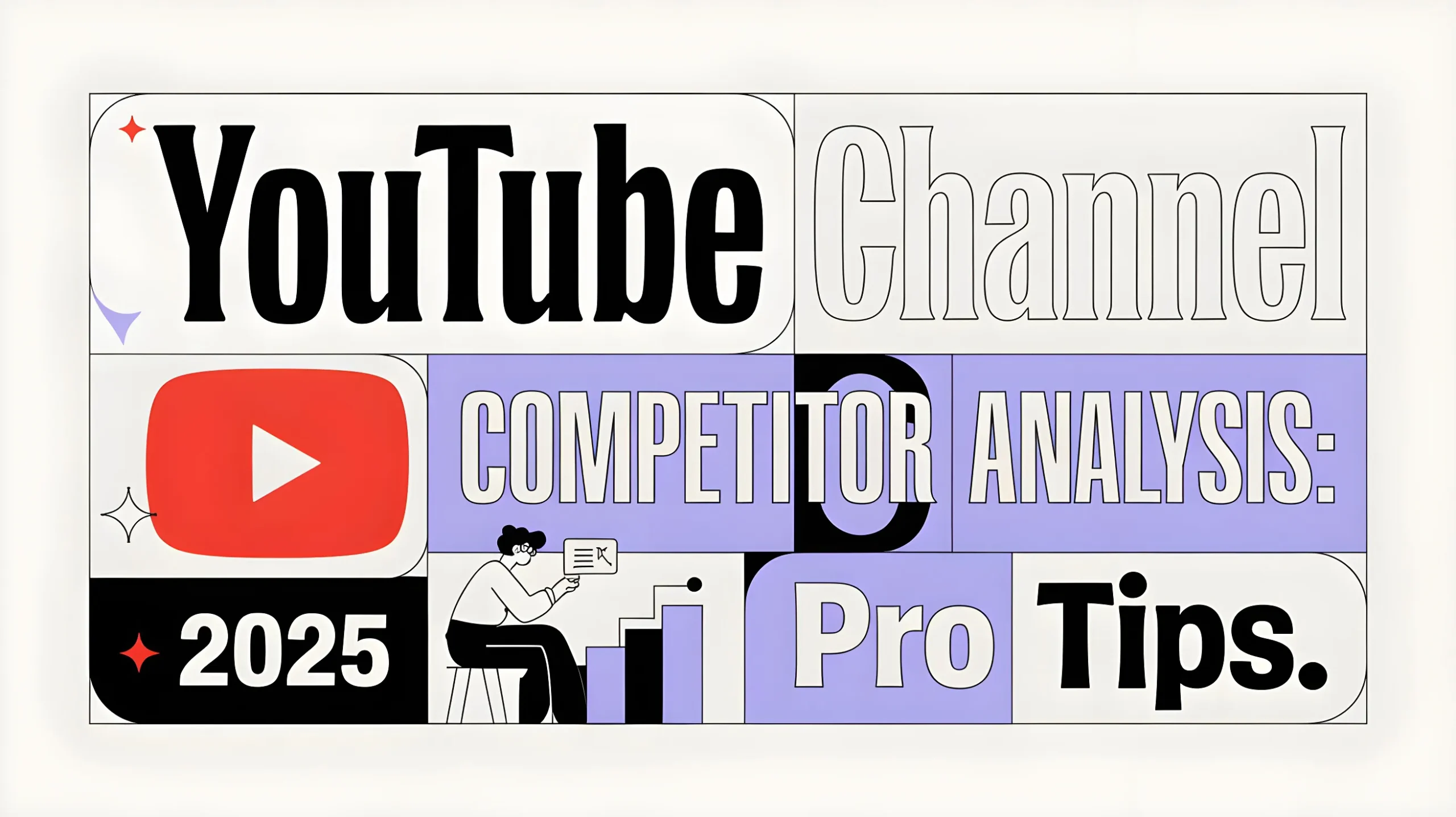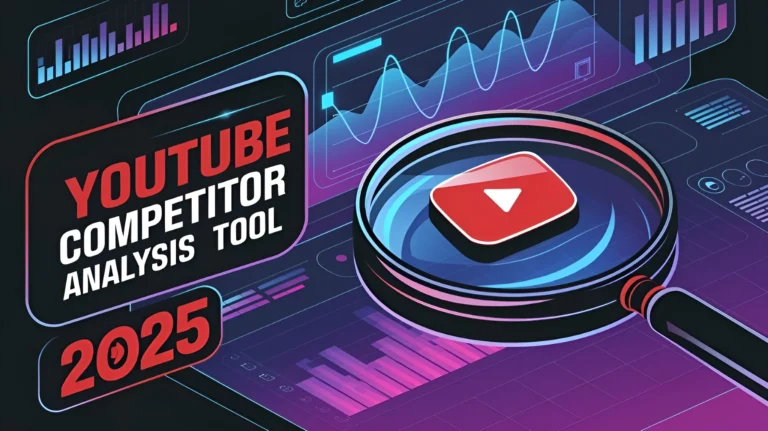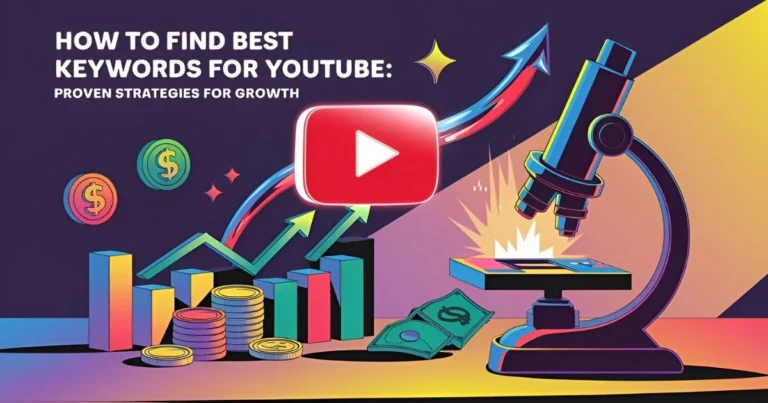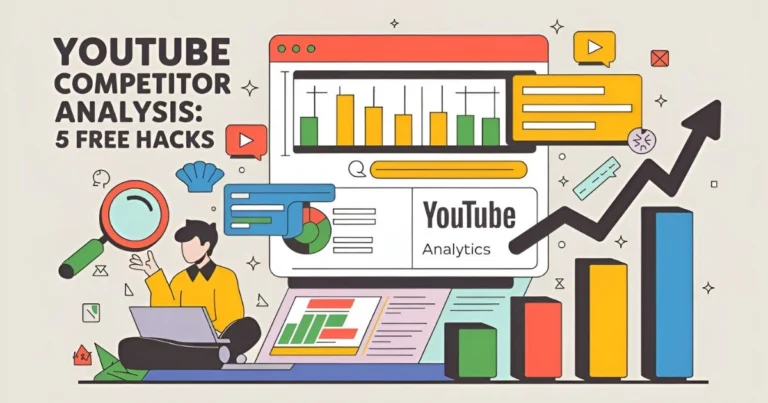Are you tired of watching your YouTube competitors soar while your channel remains stagnant? What secret strategies are top creators using to dominate their niches in 2025?
YouTube channel competitor analysis is not just a buzzword—it’s your roadmap to digital success. In the rapidly evolving content landscape, understanding how other creators operate can transform your channel’s performance.
Table of Contents
Imagine having a strategic blueprint that reveals exactly what makes successful YouTube channels tick. By dissecting competitor strategies, you’ll uncover invaluable insights that can dramatically boost your channel’s growth, engagement, and monetization potential.
This comprehensive guide will walk you through cutting-edge techniques for YouTube channel competitor analysis. You’ll learn how to decode content patterns, track performance metrics, and develop a winning strategy that sets you apart in an increasingly competitive digital ecosystem.
what is youtube channel competitor analysis?
YouTube is a competitive place. To grow, you need to analyze your competitors. This is key for reaching more viewers. Start by learning what makes a channel successful. Good analysis lets you see where you can get better.
Why Competitor Analysis Matters in 2025
Competitor analysis helps you understand what other YouTube channels are doing to succeed. In 2025, YouTube is more competitive than ever, and knowing what works for others can give you an edge.
By studying your competitors, you can learn from their strengths and avoid their mistakes, which can help your channel grow faster.
In 2025, the YouTube landscape is constantly changing, so keeping an eye on your competitors is important. It helps you stay updated on trends, video topics, and engagement strategies that are working.
Key Metrics That Define Channel Success
- View count and watch time
- Subscriber growth rate
- Engagement metrics (likes, comments, shares)
- Average video retention
Essential Elements of Competitive Research
Deep research is needed for competitor analysis. Look at these important areas:
| Research Focus | Key Insights |
|---|---|
| Content Strategy | Video topics, style, and frequency |
| Audience Engagement | Comment interactions, community building |
| Monetization Techniques | Sponsorships, ad revenue, merchandise |
Setting Baseline Performance Standards
To compete well, set clear goals. Recommended tools for competitor analysis include:
- TubeBuddy
- VidIQ
- Social Blade
- YouTube Studio Analytics
The key to success is not just understanding your competitors, but learning from their strategies and creating unique value for your audience.
Top YouTube Analytics Tools for Competitor Research in 2025
YouTube is a tough place to stand out. To see how you’re doing, you need top-notch analytics tools. These tools are key for creators who want to lead in 2025. Choosing the right YouTube analytics tools is important. Look for tools that help you:
- Track your performance in real-time
- Analyze your competitors deeply
- Learn about your audience
- Get tips on what content to make next
Here are the top YouTube analytics tools to change your game:
| Tool Name | Key Features | Pricing |
|---|---|---|
| TubeBuddy | Keyword research, tag suggestions, competitor tracking | Free – $49.99/month |
| VidIQ | Content optimization, trend analysis, engagement metrics | Free – $79/month |
| Social Blade | Channel rankings, growth tracking, comparative analytics | Free – $49.99/month |
The right YouTube analytics tools can transform your channel from guesswork to strategic precision.” – Digital Marketing Experts, Use more than one YouTube analytics tool. No one tool shows the whole picture. Mixing tools gives you a full view.
tubebuddy: the best all in one growth tool
With TubeBuddy, you can track your competitors, discover trending keywords, and optimize your content effectively.
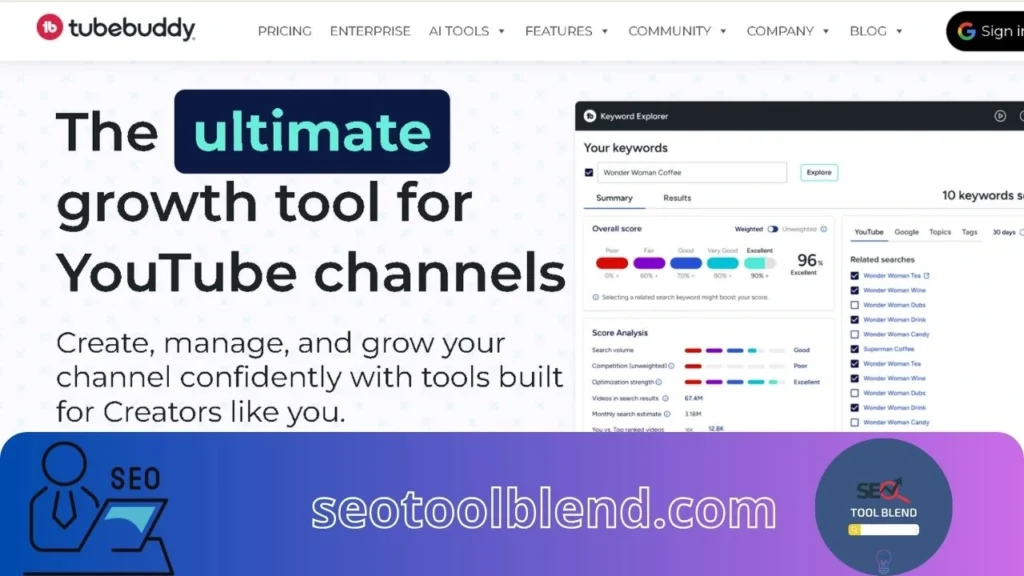
- Keyword research to improve video rankings
- Tag suggestions to boost discoverability
- Competitor tracking to analyze their performance
- SEO tools to enhance video optimization
- Analytics for better decision-making
Doing well on YouTube means knowing these advanced tools. They give you insights that help you make smart content choices. This way, you can stand out in the busy online video world.
Identifying Your Direct YouTube Competitors
Finding the right competitors for your YouTube channel is key for growth. It helps you see where you stand and find ways to get better.
When you start looking at competitors, focus on important areas. These will give you deep insights into your YouTube world.
Channel Size and Niche Verification
First, find channels that match your content and have similar viewers. Look for creators who:
- Make content in your exact topic area
- Have about 20-50% more or less subscribers than you
- Get lots of comments and likes on their videos
Content Overlap Assessment
Next, check how similar their content is to yours. Look at:
- The topics and themes of their videos
- How often they post
- The length and style of their videos
- How their viewers interact with them
Audience Demographics Comparison
It’s also important to know who watches your competitors’ videos. Look at:
- The age of their viewers
- Where their viewers are from
- What their viewers are interested in
- How engaged their viewers are
By carefully looking at these points, you’ll get a clear picture of your competition. This will help you grow your channel in smart ways.
Analyzing Competitor Content Strategy and Patterns
To grow your YouTube channel, you need to study your competitors. They have secrets to success that you can learn. By looking at their content, you can find ways to make your channel better.
When you check out your competitors’ content, focus on a few key things:
- Video Topic Selection
- Content Format Diversity
- Production Quality
- Audience Engagement Techniques
Don’t just look at the surface. Find patterns in their successful videos. Notice things like:
- Recurring video themes
- Storytelling techniques
- Visual presentation styles
- Audience interaction methods
Tracking specific metrics is part of the process. Make a detailed spreadsheet to track:
- Video topics
- Average views
- Engagement rates
- Viewer comments and feedback
The aim is not to copy but to find your own path. By studying your competitors, you can find new ideas. This will help your channel stand out and grow.
How to Track Competitor Video Performance Metrics
To track your YouTube competitors, use YouTube analytics tools wisely. Knowing these metrics helps you see how your channel can grow and where you stand against others.
- Choose good YouTube analytics tools
- Find important performance signs
- Use benchmarking methods
- Make a plan for tracking
Engagement Rate Analysis
Engagement rate shows how people interact with your competitor’s videos. YouTube analytics tools let you check:
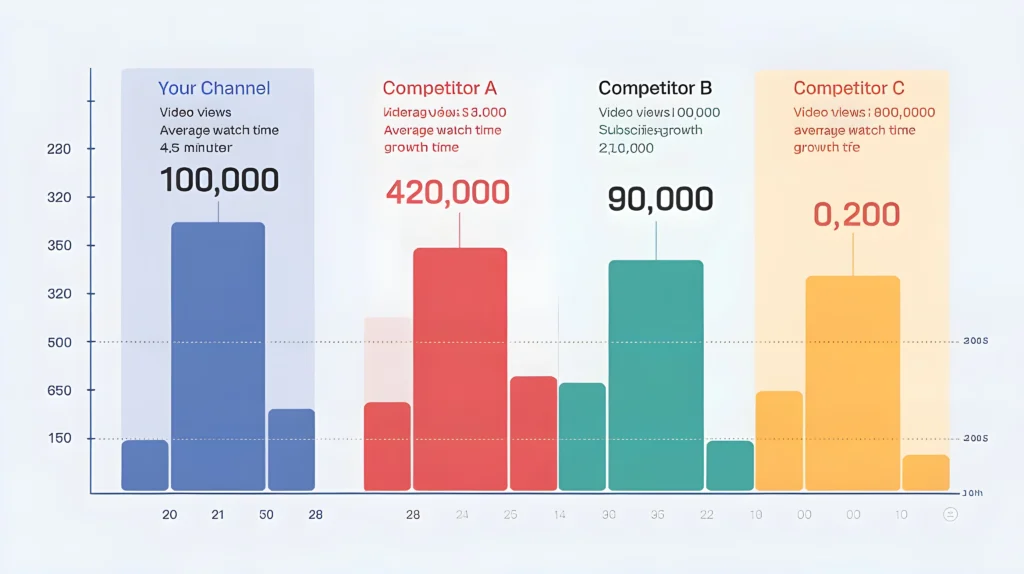
- Total likes and comments
- How many views turn into interactions
- Average watch time
- How well viewers stay engaged
View Count Patterns
Looking at view count trends gives you key insights. Find patterns that show what content works well.
Subscriber Growth Tracking
Watching how subscribers grow shows you how your competitors work. YouTube analytics tools show how they get more subscribers and how fast.
| Metric | Significance | Analysis Strategy |
|---|---|---|
| Average Views | How popular content is | Compare videos in different categories |
| View Growth Rate | How fast a channel is growing | Watch for monthly view increases |
| Peak Viewing Times | Time that viewers are most active | Pick a good time to post |
Decoding Competitor Monetization Strategies
When you analyze YouTube channels, knowing how they make money is key. Top creators use many ways to earn money. This helps them make more. Successful YouTube channels use different ways to make money:
- YouTube Partner Program ad revenue
- Sponsored content partnerships
- Merchandise sales
- Affiliate marketing
- Patreon or crowdfunding platforms
Your analysis should look at these money-making strategies. Look beyond surface-level metrics and examine how top creators convert audience engagement into sustainable income. “The most successful YouTubers treat their channel like a business, not just a hobby.” – Creator Economy Expert
When looking at how competitors make money, notice:
- How often they do sponsored content
- The types of products or services they promote
- If their sponsorships match their channel’s theme
- How their audience reacts to these efforts
By studying how competitors make money, you can find better ways to earn from your channel.
YouTube SEO Tips from Top-Performing Competitors
Mastering YouTube SEO means learning from the best. Top channels show us how to get noticed. Their secrets can boost your channel’s growth.
Top channels use advanced YouTube SEO tips. They know optimization is more than just keywords. It’s a mix of many strategies.
Title and Description Optimization Strategies
Your video’s title and description are key for YouTube SEO. Here’s what top creators do:
- Use targeted keywords in the first 50-60 characters
- Make titles that grab attention
- Put relevant search terms in your description
- Write descriptions that add value
Example: title and description optimization
Let’s say you’re creating a video about “How to Bake a Chocolate Cake.” Here’s how you can optimize your title and description for YouTube SEO:
Title:
“How to Bake the Best Chocolate Cake – Easy Recipe for Beginners”
This title includes the targeted keyword “How to Bake a Chocolate Cake,” and the phrase “Easy Recipe for Beginners” helps catch viewers’ attention.
Description:
“Learn how to bake the best chocolate cake with this simple, beginner-friendly recipe. In this video, we walk you through every step, from mixing ingredients to baking the perfect cake. Watch now and impress your friends with your baking skills! Keywords: chocolate cake recipe, baking tips, easy chocolate cake.”
The description clearly includes relevant keywords like “chocolate cake recipe” and “baking tips” while also providing value by explaining what the video is about.
Advanced Tag Strategy Analysis
Competitive tag research is a big SEO win. Tools like TubeBuddy and VidIQ help find top tags:
| Tool | Key Features | Pricing |
|---|---|---|
| TubeBuddy | Keyword research, tag suggestions | Free/Paid plans |
| VidIQ | Competitor tag analysis | Freemium model |
Thumbnail Design Insights
Thumbnails are your first chance to impress. Top YouTubers make thumbnails that:
- Use bright, contrasting colors
- Include readable text
- Feature expressive facial expressions
- Match the video’s content
By using these YouTube SEO tips, you’ll get more views. And you’ll attract viewers who are really interested.
Leveraging Competitor Upload Schedules and Timing
Learning how to analyze your competitors’ upload times can really boost your channel. It helps you know the best times to post. This way, you can catch more viewers’ attention.
Top YouTube creators don’t just post randomly. They plan their uploads to grab viewers’ interest. Your strategy should look for patterns in when they post and when they get the most views.
- Analyze top channels in your niche
- Track consistent upload windows
- Identify audience peak viewing hours
- Compare engagement metrics across different time slots
Use YouTube Analytics to understand your specific audience’s watching habits.
| Competitor | Upload Frequency | Peak Engagement Times |
|---|---|---|
| Tech Reviewers | 3-4 videos/week | Wednesday 6-8 PM |
| Gaming Channels | Daily uploads | Friday 7-10 PM |
| Cooking Channels | 2 videos/week | Sunday 12-2 PM |
Creating a smart upload schedule takes time and effort. You want to make a schedule that keeps viewers coming back for more. This way, they’ll look forward to your next video.
Creating an Action Plan Based on Competitor Analysis
Turning your YouTube channel analysis into a plan needs careful thought and action. Your research shows the way to grow. But, making it happen needs both precision and creativity. Begin by picking the most important parts of your analysis. Look at:
- Content gaps your competitors are missing
- High-performing video formats
- Audience engagement strategies
- Optimization techniques
Data without action is just information. Transformation happens when you strategically apply your competitive insights.
Your analysis shows chances to stand out. Make a plan by:
- Identifying your channel’s unique value proposition
- Mapping competitor strengths and weaknesses
- Developing a content calendar that addresses audience needs
- Experimenting with proven successful formats
Key recommendations for your action plan include adapting successful strategies while maintaining your channel’s authentic voice. Don’t simply copy competitors—innovate based on their insights.
Keep an eye on how you’re doing, making changes as needed. Remember, lasting growth comes from smart, data-driven choices that connect with your audience.
Advanced YouTube Channel Competitor Analysis Techniques
Mastering youtube channel competitor analysis means using advanced analytics tools. Tools like TubeBuddy and VidIQ give deep insights. They help find hidden ways to beat your competition.
Look beyond just numbers. Check out backlinks, off-platform marketing, and content trends. Use keyword gap analysis to find new content ideas. Focus on engagement, retention, and metadata to get ahead.
YouTube analytics keeps changing. Use tools with machine learning to predict what works. Stay on top of algorithm updates and track competitors well. This way, you can always make better content.
Use a mix of numbers and insights for competitor analysis. Keep learning and trying new SEO tips. The online world changes fast. Being quick to adapt will help your channel grow.

FAQ About: youtube channel competitor analysis
What is YouTube channel competitor analysis?
YouTube channel competitor analysis is a way to study other channels. You look at their content, how well they do, and what works for them. It helps you find ways to improve and spot gaps in your content.
Why are YouTube analytics tools important for competitor research?
Tools like TubeBuddy and VidIQ give deep insights into how others do. They show you engagement, view patterns, and more. This helps you make smart choices for your channel.
How often should I conduct competitor analysis?
Do a full analysis every 3-4 months. YouTube changes fast. Staying up-to-date helps you keep your strategy fresh.
What are the most important metrics to compare with competitors?
Compare view count, watch time, and engagement. Also, look at subscriber growth and how often they post. These show how well a channel is doing.
Can competitor analysis help with YouTube SEO?
Yes! By looking at how others use titles, tags, and thumbnails, you learn about SEO. This can help your videos get found more easily.
Is it ethical to use competitor analysis for my YouTube strategy?
Yes, it’s okay to analyze competitors. Just don’t copy them. Learn from their strategies and make them your own.
What are some free tools I can use for YouTube competitor analysis?
Use YouTube’s Analytics, Google Trends, and Social Blade for free. Also, try basic versions of TubeBuddy and VidIQ. They offer useful insights without costing money.
How do I identify the right competitors to analyze?
Find channels that are similar to yours. Use YouTube’s search and explore related channels. Choose creators who are doing well but not too big.
Can competitor analysis help me monetize my YouTube channel?
Yes, it can. By studying how others make money, you can find better ways to earn. This depends on your content and audience.
How detailed should my competitor analysis be?
Make it detailed but focused. Look at content quality, how often they post, and how they engage with viewers. Aim for insights, not too much info.

